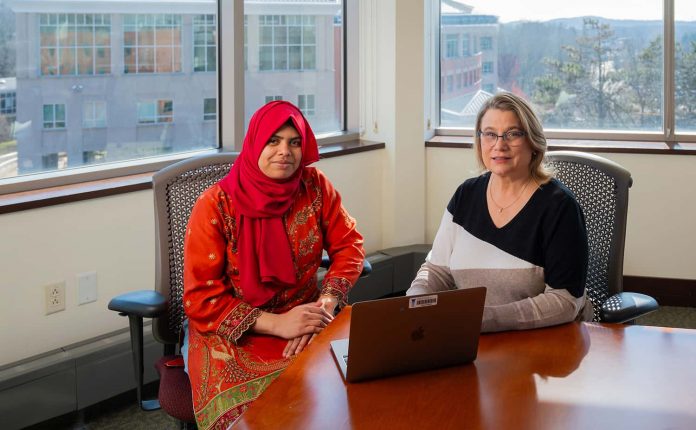The job market is changing, and changing rapidly. Some industries are unrecognizable from decades ago. In fact, job skill requirements have transformed almost 25 percent in the past decade and are projected to transform almost 50 percent by 2027. Three-quarters of employers worldwide have a hard time finding qualified workers, a study by staffing agency Manpower Group found. Yet two in five Americans see themselves as underemployed, with untapped talents and knowledge.
Aiming to correct that disconnect on a local level is Amy Feest, the new senior director of Southern’s Office of Workforce and Lifelong Learning, nicknamed OWLL, after the university’s avian mascot. To make OWLL accessible to all, Feest has created a centralized, easy-to-use website for all professional development and continuing education programs at Southern. The site spotlights credit-level undergraduate and graduate certificate programs as well as non-credit training, professional development, and workforce credentialing in fields including STEM (science, technology, engineering, math), health and human services, business and leadership, education and humanities, arts, and social and behavioral sciences.
“I want to create a one-stop shop at Southern for anyone in our community who wants to upskill and reskill, obtaining workforce skills without necessarily pursuing a full degree,” says Feest. “We can become a workforce hub for Greater New Haven and beyond, with learning opportunities for anyone looking to attain a new career or advance in a current career.”
For example, the Drone Academy is a cutting-edge, hands-on training program on how to use the unmanned aerial vehicles now popular in industries from farming and real estate surveying to police and fire search and rescue. The non-credit certificate program has five modules, and learners in the academy are taught to fly a drone safely, how to become FAA-certified, and how to use software to take aerial photographs and videos to create landscape mapping and 3D modeling. OWLL lists the program under both STEM and humanities since drones have so many workforce applications.
In this program, students are actually drone pilots and need to follow all the rules of FAA airspace, Feest says, adding, “You could do a lot of damage if you go to the wrong place, or get too close to an airplane, airfield, or submarine base.”
Another cutting-edge program being offered is the Cybersecurity Maturity Model Certification. “CMMC is very specific training for defense industry subcontractors,” Feest says of the five-week non-credit training. “The federal government has a new rule requiring that subcontractors working with the Department of Defense be held to a higher level of cybersecurity scrutiny, especially in light of the unprecedented number of cyber-attacks that business and industry are experiencing.”
Regarding non-credit courses, Feest hopes to inspire people to keep learning and rise above the limiting beliefs some hold about themselves. “Many people don’t see themselves as having the potential to enroll in college,” she says. “But if they successfully complete a non-credit training, they will hopefully think, ‘Wow, I didn’t think I’d be able to do that, and I really enjoyed it.’ Starting off with one non-credit program has huge potential to funnel students into credit-bearing degrees and certificates.”
With that goal in mind, OWLL hopes to work with SCSU faculty to build “stackable” programming, where some successfully completed non-credit training can used as credit for prior learning towards a credit-level certificate or degree program at Southern.
Feest has also established an advisory council composed of professionals from the industry, nonprofit, and economic development sectors in the Greater New Haven community, along with several representatives from Southern. The council is reviewing new workforce proposals highlighting Southern’s expertise in computer science, education, science, arts and humanities, and more.
Feest’s graduate assistant, Sharaban Tohura, is researching potential new credentials within BioPath, a partnership between Southern and New Haven. Greater New Haven is home to the second-biggest cluster of biotech companies in New England, and BioPath offers boot camps for in-demand bioscience skills and connects students to internships. Tohura, who has a medical school degree and a master’s in biochemistry from Bangladesh, is pursuing a master’s in public health from Southern.
A digital badging program – a visual icon that provides skill validation for potential employers and can be added to a resume or LinkedIn – will be rolled out during spring 2024. “It’s a really big movement in support of workforce, allowing employers to see that potential hires are proficient in critical skill areas,” says Feest. “Digital badges can be awarded in credit courses, non-credit training, and extracurricular programming, with computer science, business, and healthcare being early adopters.”
As head of OWLL, Feest weaves together threads from her 25-year career in the Connecticut State University System, where her positions ranged from AVP of Programs and Curriculum for CT State to tenured professor of marketing at Tunxis Community College to public relations director for CSU’s system office in Hartford. However, she saw the power of upskill training as the PR director for VNA Health Care, where she created and taught a customer service program for all front office staff. “I saw how much the participants took away from the training, and it is what hooked me into wanting to help people grow in their personal and professional lives,” she says.
Julia Irwin, interim dean of the School of Graduate and Professional Studies, notes of Feest that “She’s developing programming to meet workforce needs for today and the future, from cloud-based services to drones, making our programs much more far-reaching than before.”
Feest is enthusiastic about her main goal, which is, she says, for “Southern to become a workforce hub for Connecticut and beyond… creating noncredit training that is accessible and affordable for learners and that meets the workforce needs of employers.”


